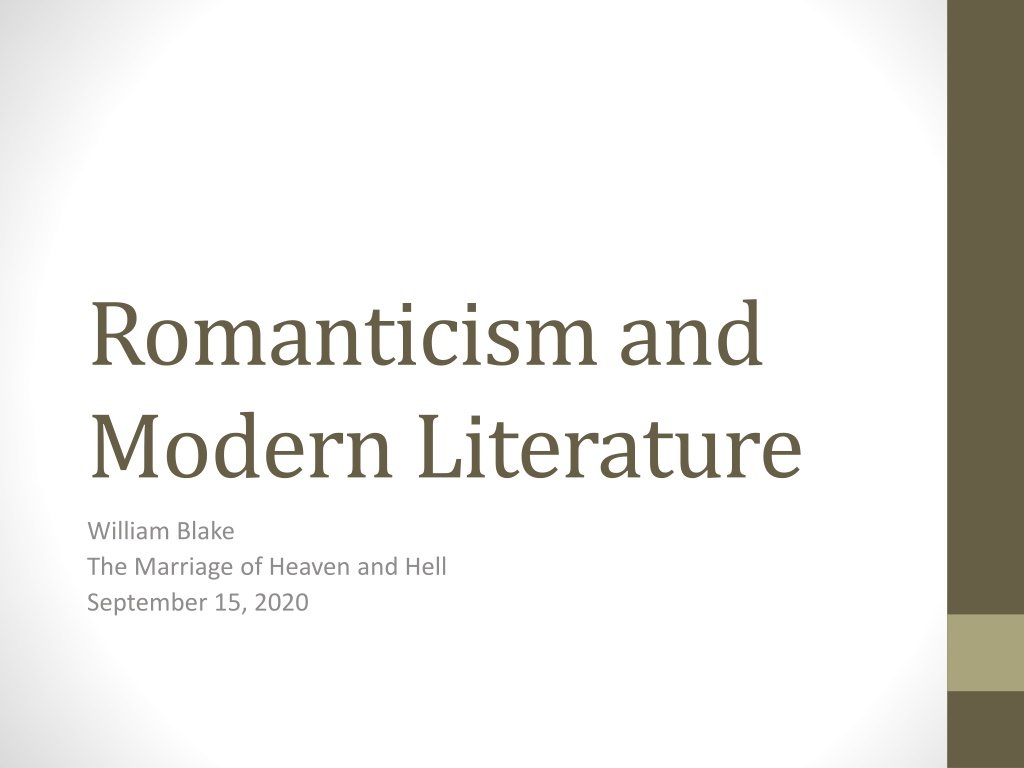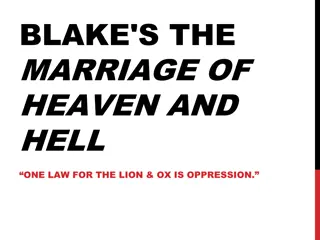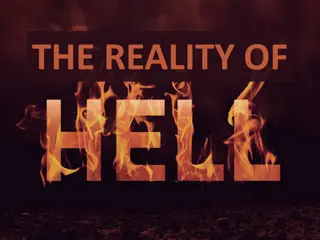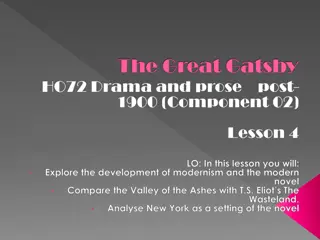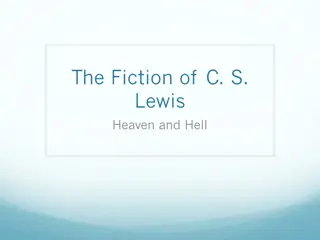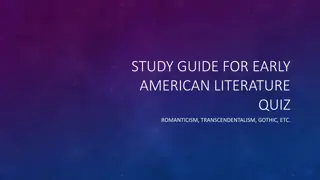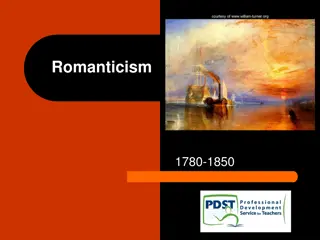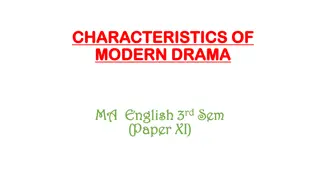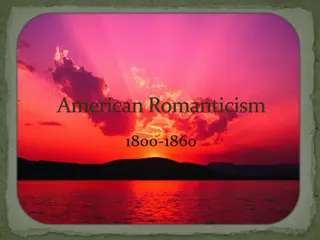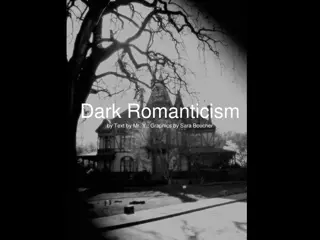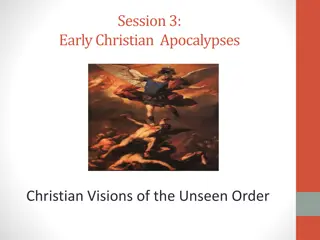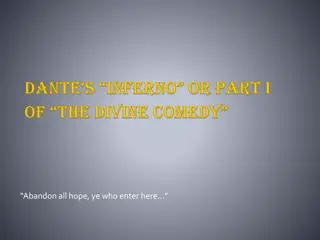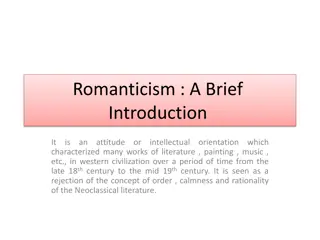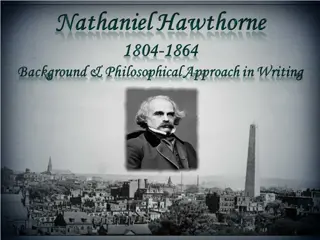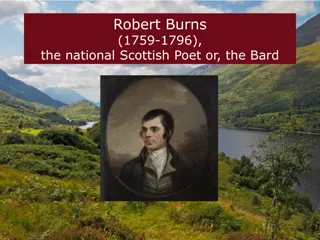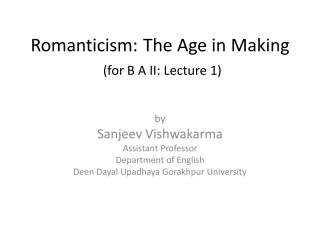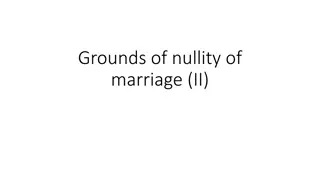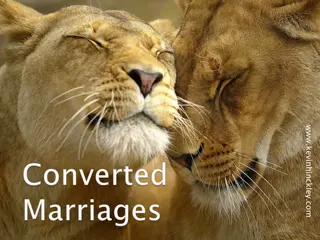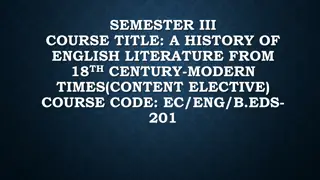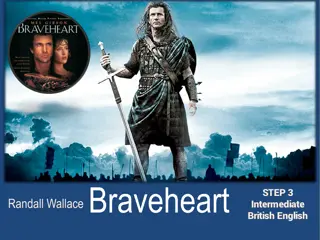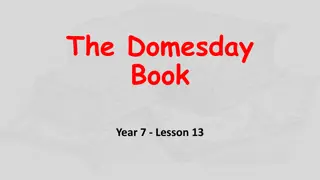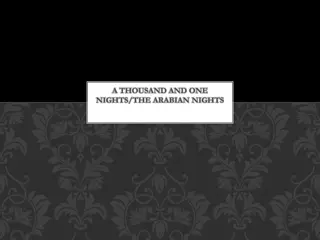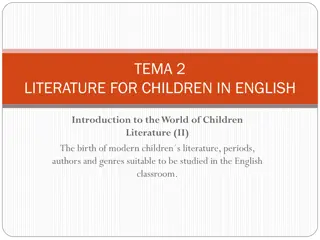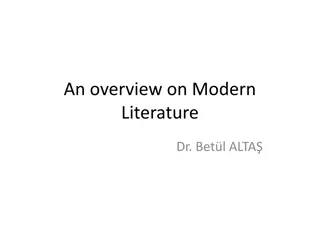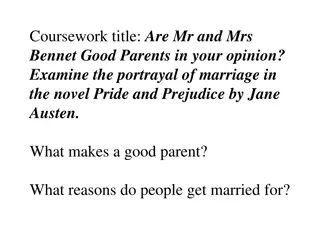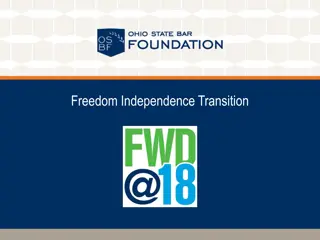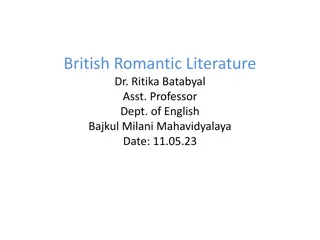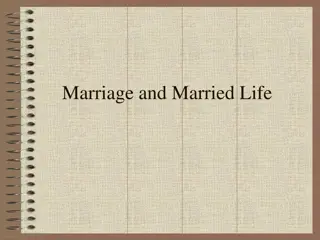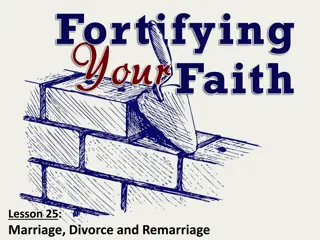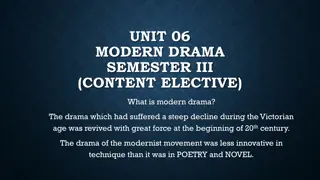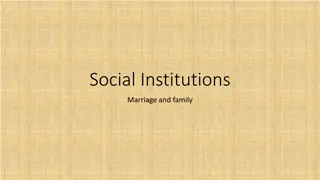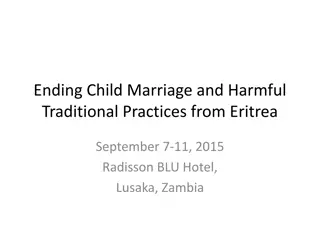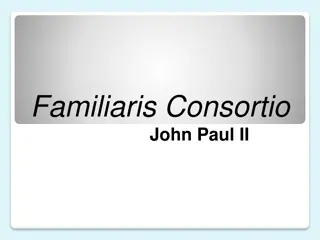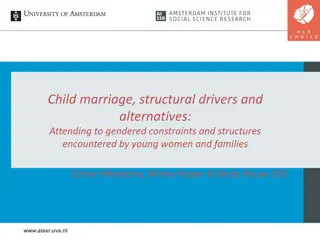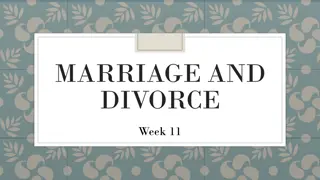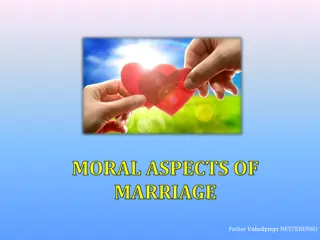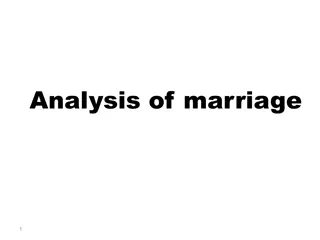William Blake's The Marriage of Heaven and Hell: Exploring Romanticism and Modern Literature
William Blake's "The Marriage of Heaven and Hell" delves into themes of contraries, creative imagination, and Gnosticism, challenging conventional beliefs about good and evil, and the relationship between the physical and metaphysical worlds. Blake's work critiques traditional religious notions, emphasizing the importance of imagination and unity between the human and divine realms.
Download Presentation

Please find below an Image/Link to download the presentation.
The content on the website is provided AS IS for your information and personal use only. It may not be sold, licensed, or shared on other websites without obtaining consent from the author. Download presentation by click this link. If you encounter any issues during the download, it is possible that the publisher has removed the file from their server.
E N D
Presentation Transcript
Romanticism and Modern Literature William Blake The Marriage of Heaven and Hell September 15, 2020
The Main Contents of The Marriage of Heaven and Hell 1. A sequence of paradoxical aphorisms such as Man has no Body distinct from his Soul...Energy is the only life, and is from the Body...Energy is Eternal Delight. Milton "was a true Poet and of the Devil's party without knowing it. Proverbs of Hell celebrating the holiness of the natural world. A sequence of visionary encounters with angels and prophets where he criticizes Swendenborg. Romanticism and Modern Literature Slide 04 2. 3. 4. 2
The Two Concepts of The Marriage of Heaven and Hell 1. The notion of contraries, or opposing forces: Without Contraries is no progression meaning that Attraction and Repulsion, Reason and Energy, Love and Hate, are necessary to Human existence. The reversed idea of Good and Evil: Good is the passive that obeys Reason. Evil is the active springing from Energy. Satirizing the notion of the Old Testament of Jehovah(Urizen). Blake rejects the notion of God as a ruthless, rule-making punisher who is guided by an impersonal, stony rationalism. Blake excoriated the Christianity of his day, both Protestant and Catholic, as a form of primitive idol worship to this Old Nobodaddy with his rules and regulations, rewards and punishments. He considered the Church of England an arm of state tyranny, offering an ideological framework for un-Christian practices ranging from child labor to slavery. Romanticism and Modern Literature Slide 04 2. 3
Blakes faith in the creative imagination 1. For Blake, imagination, and not rationality or intellect, is the central faculty of mind that unites the human with the creativity of the divine. 2. Blake s faith in the creative imagination as the link between the divine and the human leads him to satirize what he perceived as the rational materialism underpinning Enlightenment Christianity. 3. Unlike the biblical Jehovah who inscribes his Ten Commandments for Moses, Blake s Devil is more concerned about imagination than ethics. The fires of hell burn away the constricting limitations of the material world as perceived by the five senses. Romanticism and Modern Literature Slide 04 4
Blakes Gnosticism 1. The very title indicates a quest for mystical unity capable of transcending the apparent dualism of the body and soul, physical and metaphysical worlds. 2. Ezekial s and Isaiah s words in one of Memorable Fancy that I saw no God, nor heard any, in a finite organical perception; but my senses discover d the infinite in everything. 3. Blake s own poetic words in Auguries of Innocence that To see a World in a Grand of Sand/ And an Heaven in a Wild Flower/ Hold infinity in the palm of your hand/ And Eternity in an hour. 4. Blake, however, did not accept the Gnostic denial of the reality of the body or physical world. Blake s infinity comes not through denial of the senses but by their expansion. Romanticism and Modern Literature Slide 04 5
Blakes idea of Jesus Christ 1. Blake sees Christ as an incarnation of the eternal Logos or Word, but one that is at odds with a biblical literalism symbolized by the Ten Commandments. 2. Blake s devil claims that Jesus was all virtue, and acted from impulse, not from rules. Romanticism and Modern Literature Slide 04 6
A Couple of Passages from The Marriage of Heaven and Hell: The Angel s condescending offer to Devil An Angel came to me and said: O pitiable foolish young man! O horrible, O dreadful state! Consider the hot burning dungeon thou art preparing for thyself to all Eternity, to which thou art going in such career. Romanticism and Modern Literature Slide 04 I said: Perhaps you will be willing to show me my eternal lot, and we will contemplate together upon it, and see whether your lot or mine is most desirable. 7
A Couple of Passages from The Marriage of Heaven and Hell: What Devil saw in Angel s Hell My friend the Angel climbed up from his station into the mill. I remained alone, and then this appearance was no more; but I found myself sitting on a pleasant bank beside a river by moonlight, hearing a harper who sung to the harp; and his theme was: The man who never alters his opinion is like standing water, and breeds reptiles of the mind. Romanticism and Modern Literature Slide 04 But I arose, and sought for the mill, and there I found my Angel, who, surprised, asked me how I escaped. I answered: All that we saw was owing to your metaphysics; for when you ran away, I found myself on a bank by moonlight, hearing a harper. 8
A Couple of Passages from The Marriage of Heaven and Hell: An Argument between Devil and Angel So the Angel said: Thy phantasy has imposed upon me, and thou oughtest to be ashamed. I answered: We impose on one another, and it is but lost time to converse with you whose works are only Analytics. Romanticism and Modern Literature Slide 04 I have always found that Angels have the vanity to speak of themselves as the only wise; this they do with a confident insolence sprouting from systematic reasoning. Thus Swedenborg boasts that what he writes is new; though it is only the contents or index of already published books. 9
A Couple of Passages from The Marriage of Heaven and Hell: Devil s lesson for Angel Once I saw a Devil in a flame of fire, who arose before an Angel that sat on a cloud, and the Devil uttered these words: The worship of God is, honouring His gifts in other men each according to his genius, and loving the greatest men best. Those who envy or calumniate great men hate God, for there is no other God. Romanticism and Modern Literature Slide 04 10
